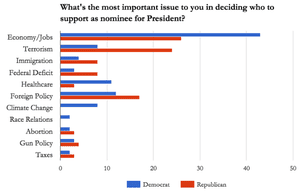Support for Ben Carson’s bid to be the Republican presidential nominee has faded, according to a poll released Wednesday by Quinnipiac University.
The poll, which was conducted after the terror attacks on Paris, from 23-30 November, showed Carson tied in third place with Texas senator Ted Cruz, both attracting 16% of Republican voters. A poll by the same company last month had Carson in second place on 23%.
Donald Trump, meanwhile, solidified his frontrunner status with 27% of voters, while Florida senator Marco Rubio attracted 17%. However, Trump remains the more divisive candidate: when respondents were asked if there were any candidates they definitely would not vote for, 26% of respondents selected Trump but only 5% ruled out Rubio.
Hillary Clinton also widened her lead in the Democrat race by a further 12 percentage points. A total of 60% of respondents who identified as Democrat or Democratic leaning said that if the primary were to be held today, they would vote for Clinton, while 30% said the same about Vermont senator Bernie Sanders. Last month in a poll by the same university, Clinton had 53% of support and Sanders was at 35%.
The 72-question telephone survey, conducted among registered voters by one of the more accurate political pollsters, also asked about specific voting concerns and uncovers a revealing shift in priorities. Republican voters showed more interest in foreign policy and terrorism compared to a month ago. Given that Carson has struggled to grasp foreign policy, changing voter concerns might well explain the candidate’s fall in support.
When asked to name the issue they considered most important in determining their vote for the Republican nomination, 26% said the economy and jobs (35% said the same last month), 24% said terrorism (previously 11%) and 17% said foreign policy (also previously 11%).
The poll showed a clear difference between the stated priorities of Republican and Democratic voters. Less than 1% of Republicans said climate change was a key concern, compared to 8% of Democrats. The No 1 concern among Democrats was also the economy and jobs – but by a clearer margin, well ahead of foreign policy and terrorism. Neither Democrats nor Republicans expressed a strong concern about gun policy or abortion when choosing a candidate – both topics were chosen by less than 5% of respondents.
Responses about current voter concerns provide more accurate numbers than responses about voting intention at the general election in 11 months’ time. An Ipsos analysis of 300 polls showed that there is an eight-point margin of error on average when polls are conducted a year before an election.
Even less reliable are responses about hypothetical scenarios about the presidential election which the interviewers described to respondents. Those numbers suggest that a race fought between Clinton and Rubio would be closer than one fought between Clinton and Trump. Below are the responses based on the various scenarios they suggested to respondents:
In a race that is ...
- Clinton v Carson: 46% to 43%
- Clinton v Trump: 47% to 41%
- Clinton v Rubio: 45% to 44%
- Clinton v Cruz: 47% to 42%
- Sanders v Carson: 47% to 41%
- Sanders v Trump: 49% to 41%
- Sanders v Rubio: 44% to 43%
- Sanders v Cruz: 49% to 39%
The Quinnipiac University survey of 1,453 registered voters nationwide has a margin of error of +/- 2.6 percentage points. The poll included 672 Republican or Republican-leaning voters and 573 Democratic or Democratic-leaning voters.


No comments:
Post a Comment